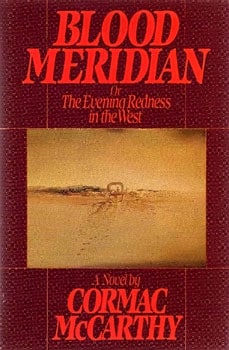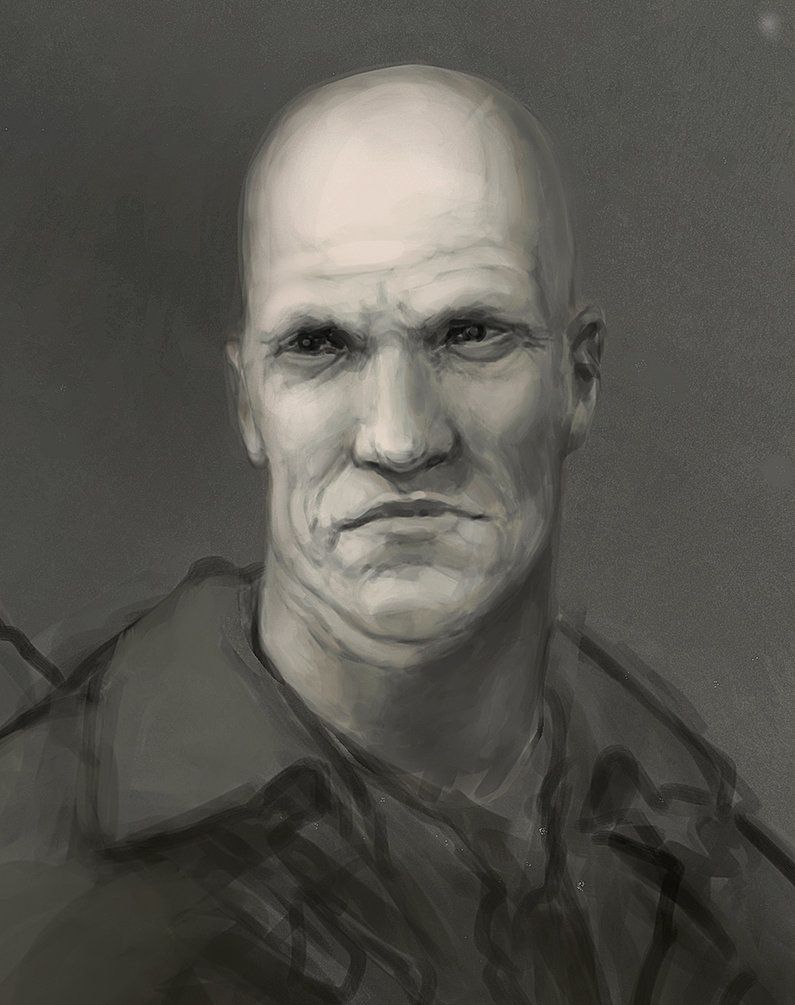 As promised, I now take up some of the philosophical and ethical problems posed by Cormac McCarthy’s remarkable novel, Blood Meridian or the Evening Redness in the West. In doing so, it’s important to note that Blood Meridian is open to any number of readings. In fact, the twenty or so intellectual historians who discussed it in Cambridge last week—at the annual IHG seminar—had myriad, often contradictory interpretations of the book. Blood Meridian is a window onto the western canon, from the Bible to Shakespeare to Milton to Nietzsche to Freud. It’s also a “western,” or rather, an anti-western in the tradition of Sam Peckinpah, Clint Eastwood, and Quentin Tarantino. Stanley Fish’s provocative argument that there are no texts in his figurative classroom, only readers, is less overstated when the “text” in discussion is as capacious as Blood Meridian.
As promised, I now take up some of the philosophical and ethical problems posed by Cormac McCarthy’s remarkable novel, Blood Meridian or the Evening Redness in the West. In doing so, it’s important to note that Blood Meridian is open to any number of readings. In fact, the twenty or so intellectual historians who discussed it in Cambridge last week—at the annual IHG seminar—had myriad, often contradictory interpretations of the book. Blood Meridian is a window onto the western canon, from the Bible to Shakespeare to Milton to Nietzsche to Freud. It’s also a “western,” or rather, an anti-western in the tradition of Sam Peckinpah, Clint Eastwood, and Quentin Tarantino. Stanley Fish’s provocative argument that there are no texts in his figurative classroom, only readers, is less overstated when the “text” in discussion is as capacious as Blood Meridian.
At first glance, I thought Blood Meridian evinced a certain conservative take on human nature in relation to civilization—on violence in relation to culture. I felt like I was reading Camille Paglia brought back to life as a preternaturally talented novelist. The violent borderlands that serve as the setting of the novel are just beyond civilization, and as such, savagery reigns supreme. Violent, Dionysian impulses are let loose outside the confines of culture. Men are free to kill, rape, torture, and commit any deranged act. The only constraint on such madness is the enemy, who is equally mad. This is human nature at its base. The edifice of our modern, urban civilization is all that keeps us from such debasements. This is a conservative notion of culture in the vein of the New Humanists. All that stands between humanity and anarchy are the refinements of culture. Human nature is otherwise timelessly violent all the way down. One of McCarthy’s three epigraphs signals such meaning:
Clark, who led last year’s expedition to the Afar region of northern Ethiopia, and UC Berkeley colleague Tim D. White, also said that a re-examination of a 300,000-year-old fossil skull found in the same region earlier shows evidence of having been scalped. – The Yuma Daily Sun, June 13, 1982
This reading of Blood Meridian is too easy. At another level, the book could be read from a diametrically opposed vantage point: as a romantic, even nostalgic critique of modern civilization in the vein of Mary Shelly’s Frankenstein. Cormac McCarthy’s Frankenstein character is, of course, Judge Holden, or simply the judge, whom Harold Bloom calls “the most frightening figure in all of American literature.” The judge, who evokes Shakespeare’s Iago, Melville’s Whale, and especially Marlon Brando’s Colonel Kurtz, is far and away the most learned, cultivated, civilized character in Blood Meridian. A multi-linguist, the judge is also versant in a range of scientific disciplines, including paleontology and chemistry. And yet, the judge takes depravity to a whole new level. Every time the Glanton Gang visits a new town, a young child goes missing, a clear allusion to the judge’s pedophilia. In this way, the judge is representative of Adorno and Horkheimer’s “dialectic of enlightenment,” a literary character appropriate to the nuclear age. The judge demonstrates that materialism and rationalism are not the antidotes to madness, but rather are the slippery slopes to nihilism. Just to make this point clear, McCarthy gives the judge a bit of dialogue that might have been ripped straight from Nietzsche: “Moral law is an invention of mankind for the disenchantment of the powerful in favor of the weak. Historical law subverts it at every turn. A moral view can never be proven right or wrong by any ultimate test.”
So which is it: does Blood Meridian display a conservative sense of human nature in relation to civilization, or does it evince a romantic critique of scientific progress? Both? Neither? McCarthy is a novelist, not a theorist. As such, Blood Meridian doesn’t offer up a clear-cut ethical stance. It is ambivalent and ironic. Even the judge’s ethics, which are not to be confused with McCarthy’s ethics, are contradictory. Although the judge at times seems like a proxy for the barbarities of modernity, at other times he mixes rationalism with the seemingly atavistic impulses of the pre-modern. The judge, who is a skilled dancer, believes that life is a cosmic dance. He is a poet of war: war is not to be understood rationally, but rather as a force that gives life meaning in often unexplainable ways. In short, the judge blurs the cosmological with the natural. Perhaps this is the philosophical position of Blood Meridian. Perhaps it is Derridian in its disavowal of the metaphysical-physical binary.
Or perhaps not.
In any case, Blood Meridian will continue to be read as a great work of art for generations to come, in part because it opens up so many timeless questions, without offering any pat answers. Also, it’s an exciting read—which should not be lost in any discussion of its philosophical and ethical implications. It is an aesthetic masterpiece.


3 Thoughts on this Post
S-USIH Comment Policy
We ask that those who participate in the discussions generated in the Comments section do so with the same decorum as they would in any other academic setting or context. Since the USIH bloggers write under our real names, we would prefer that our commenters also identify themselves by their real name. As our primary goal is to stimulate and engage in fruitful and productive discussion, ad hominem attacks (personal or professional), unnecessary insults, and/or mean-spiritedness have no place in the USIH Blog’s Comments section. Therefore, we reserve the right to remove any comments that contain any of the above and/or are not intended to further the discussion of the topic of the post. We welcome suggestions for corrections to any of our posts. As the official blog of the Society of US Intellectual History, we hope to foster a diverse community of scholars and readers who engage with one another in discussions of US intellectual history, broadly understood.
Andrew,
I am very glad that you have taken the time to review “Blood Meridian,” which I will be using next year in an undergraduate seminar called “History and Horror.” (The course will look at how historians have documented the macabre, nihilism, etc., and how literature and philosophy inform their attempts.)
In addition to your possible explanations of the Judge, I might suggest a few others that came to mind…
“The White Man”: Not very subtle, obviously, but the whole point of the story is the role of capitalism and American expansionism in closing the frontier.
“Death on a Pale Horse”: Again, not very subtle, bear with me.
“Mephistopheles,” in the Faustian sense: As you note, the Judge clearly offers a romantic critique of science and learning, the slippery moral slope of knowledge. I would add that the final lines of the book, which take place at a dance, closely mirror the dance scene in opera versions of Faust.
“The anti-Historian”: What interests me about the judge is the book into which he presses leaves and records descriptions of artifacts before destroying them. Whereas most scientists, archaeologists, and historians record information for its preservation, the Judge does so to obscure it and wipe it from human memory. (He has a line like that somewhere in the book.) It seems like the wanton destruction in “Blood Meridian” is not just directed at individual people, and is not just an instance of genocide, but represents the erasure of an entire world, rendering it prehistoric.
Anyway, I look forward to hearing other people’s reactions to the book, and I might have my students read this thread in the fall.
Best,
Cam
Cam: Thanks for the wonderful comment. “History and Horror”–what a cool class! Can I take it? Seriously, though, what else are you assigning?
I think all of your other suggestions for how to interpret the judge are sensible. Like I said, Blood Meridian is nothing if not capacious. Interestingly, many of the other folks who participated in the Cambridge seminar teach Blood Meridian, and they said their students’ first inclination is usually to interpret the book as a simple, perhaps didactic indictment of Manifest Destiny. Thus the judge as White Man. There is this element to the novel, no doubt. But I think McCarthy works hard to “complicate” it as well, for example, with the epigraph that I quote above that suggests a timelessness to humanity’s capacity for violence. Also, the first major battle scene, a long passage of which I cited in my post last week, is of Comanches slaughtering whites, not vice versa. I think this was intentional. None of which is to suggest McCarthy is pro-American expansionism, far from it. But it’s complex.
This is horrible: I haven’t read a novel that wasn’t for coursework / reading lists since I started the MA program in 2008. I think it’s high time I started reading fiction again for the sheer pleasure of it. I doubt it would make me write a dissertation any slower, and it might actually help.
The summer before I started the MA, I spent a few weeks taking care of my grandparents on their farm. No internet access, and I had already read every book in their house a hundred times over. So I went to Barnes&Noble and bought the longest novels I could find in their B&N Classics section that I hadn’t already read. I picked up Bleak House and Of Human Bondage, and enjoyed them both immensely. I think the last (fairly) contemporary novel I have read that wasn’t for coursework/exams was Jonathan Strange & Mr. Norrell — a marvelous book, and an homage par excellence to the Victorian novel.
Honestly, though, I don’t know what in the world I would even read now, besides what I need to read for my research. Somewhere up in my dissertational brain sit the Mad Hatter and the March Hare, shouting, “No room! No room!”
Hmmm. Maybe I should start with Alice in Wonderland. Remember what the dormouse said…